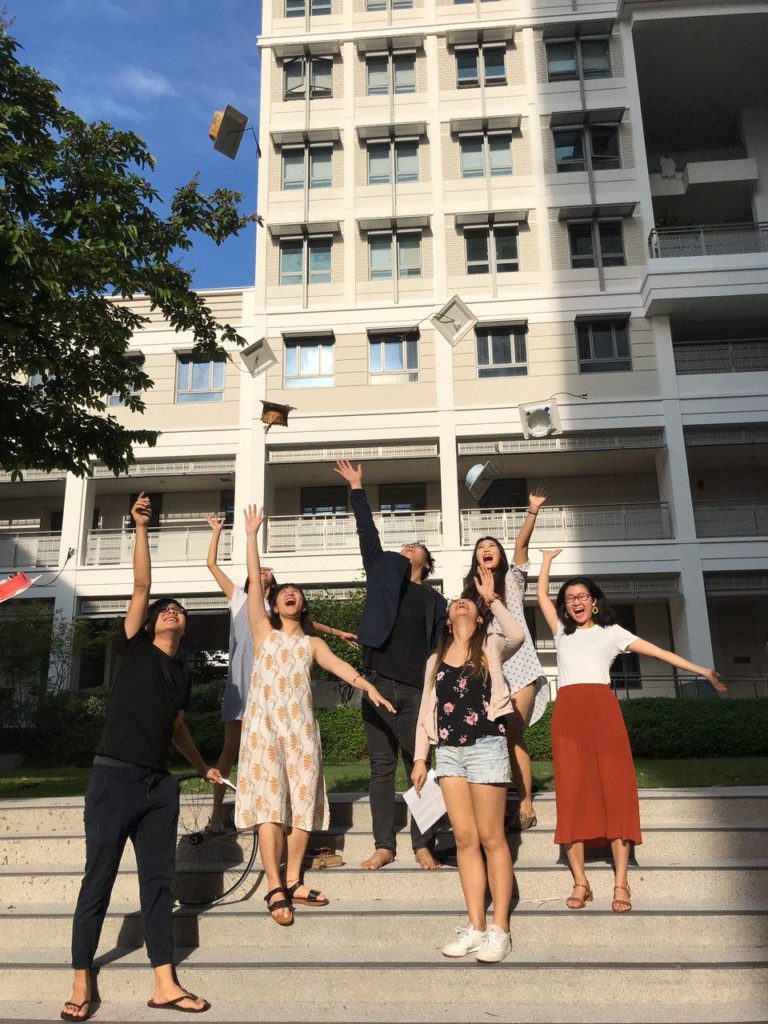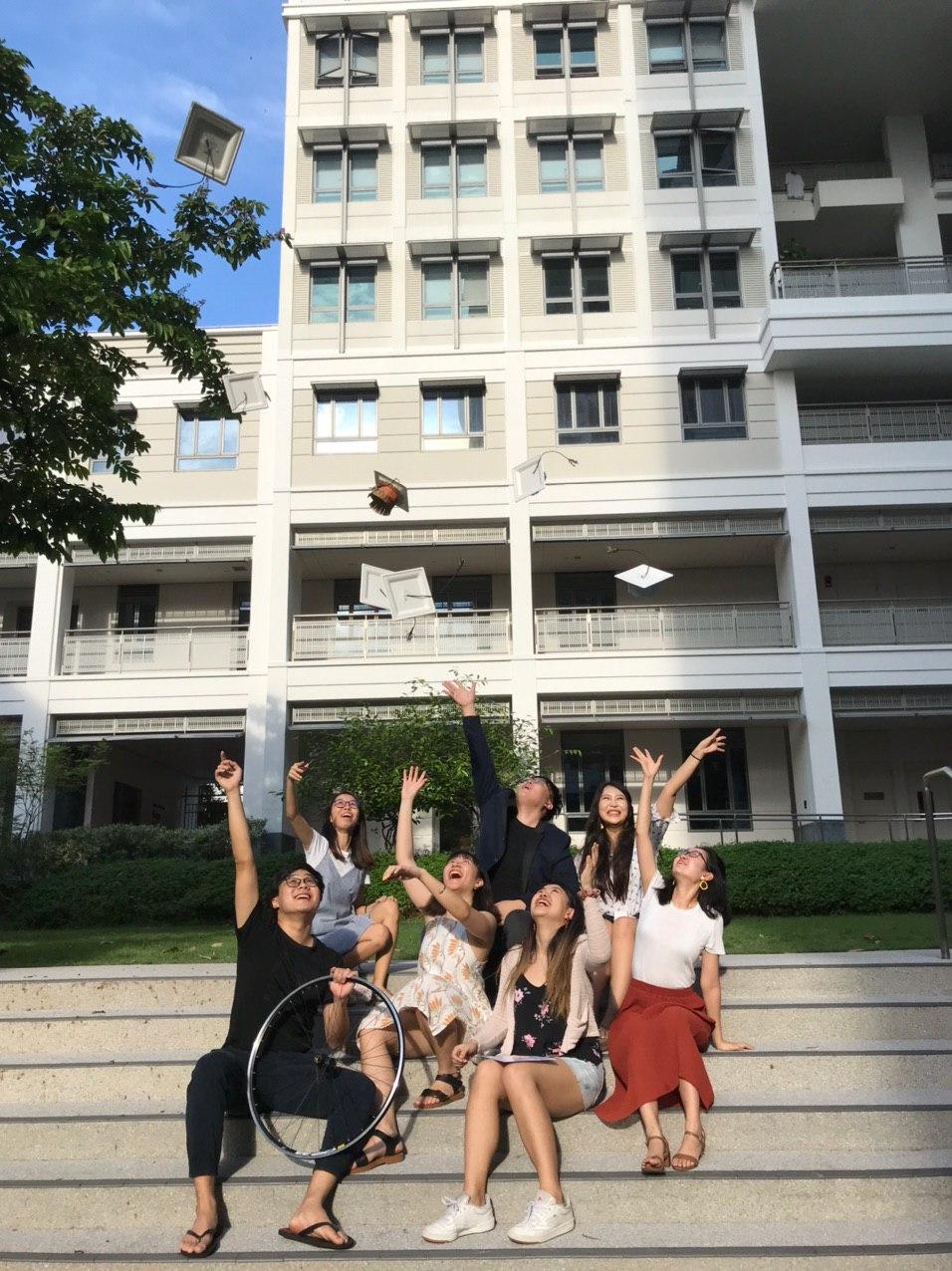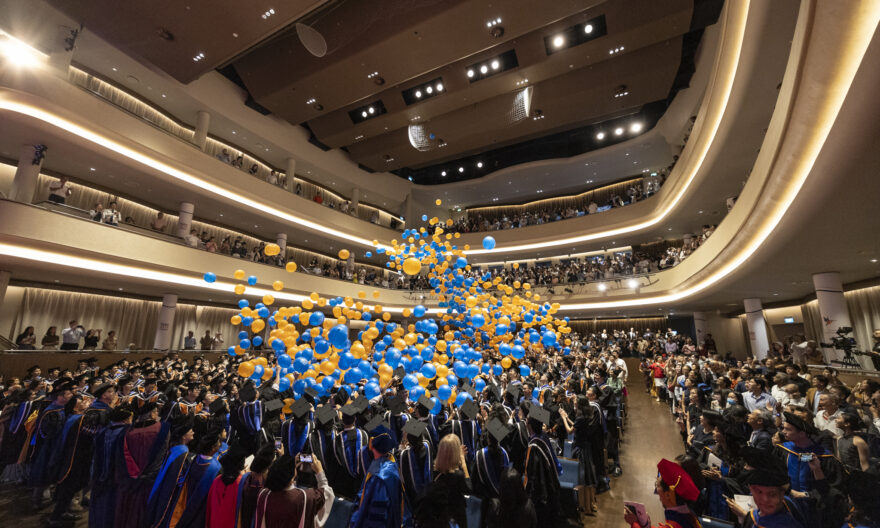Life in a time of COVID-19: Yale-NUS College rises to the challenge
 Students celebrating a mock graduation. Image provided by Ng Xin.
Students celebrating a mock graduation. Image provided by Ng Xin.
Amid the current COVID-19 situation, Yale-NUS students, staff and faculty have come together to support one another in various ways so that the College community could have as open and active a semester as possible amid rapidly changing circumstances, with timely measures implemented that place health and safety at the forefront.
As a young liberal arts college, Yale-NUS has been administratively nimble to respond to changes, putting in place various measures to ensure that life continued as normally as possible while prioritising the health and well-being of everyone in the community.
The weekend after the Singapore government announced the Disease Outbreak Response System Condition (DORSCON) Orange on 7 February – an indicator of the heightened situation in Singapore – the College required all visitors to have their temperature taken and to register for potential contact tracing before entering campus. It also implemented mandatory twice-daily self-reported temperature checks for faculty and staff (students had had to do this since 28 January).
In line with the College’s business continuity plan, staff and faculty began alternate-week remote working measures. Students who preferred not to attend physical classes could opt for e-learning via online platforms. Faculty were also given flexibility in delivering their classes.
As the situation developed, physical spaces were cordoned off to comply with safe distancing guidelines, and events larger than a certain size were cancelled.
When Singapore introduced what it termed ‘circuit breaker’ measures from 7 April – mandating all but essential workers to stay at home, unless purchasing necessities – the College immediately complied: all but essential staff began working from home, classes were moved fully online, the campus was closed, and all students were encouraged to head home if they were able to.
“Things changed at a very rapid rate within the span of a few weeks. Once we adapted, there would be new information given,” said Marcus Chua (Class of 2021).
“But this was never an us-against-the institution situation. Faculty and the administration were always accommodating, and if students truly didn’t feel like physically going to class, people would understand,” he added.
Despite the increased measures, the community has found creative ways to stay connected. Athletics programming has continued, with classes such as Zoom-ba allowing members of the community to participate in regular mood-boosting Zumba workout sessions from their rooms, and online fitness videos uploaded onto Facebook for those seeking a guided exercise session.
“Our ability to respond as the situation evolves is due to our preparedness. Our senior leadership team understands the importance of crisis management and has invested significant time and energy into business continuity planning for all potential risk scenarios, including training such as table-top exercises of potential scenarios such as this for key staff and faculty members,” said Ms Kristen Lynas, Executive Vice President (Administration) of Yale-NUS.
“Our staff and faculty members have been working tirelessly to put in place our business continuity plans and implement precautionary measures for the well-being of our community. They have shown great resilience and care for one another during this time and I am immensely proud of them,” she added.
In tandem with the migration of classes online, the College moved to alternative modes of assessment such as online examinations or assignments. It assisted all Yale-NUS exchange students abroad to return to Singapore or their home countries, and helped exchange students from other institutions at Yale-NUS to return to their home countries if possible, and to support them in Singapore if not.
As overseas summer plans have been impacted by the COVID-19 situation, the College is actively helping affected students explore programmes, research or internships opportunities in Singapore, or encouraging them to consider opportunities in their home countries. The College has also expanded its Summer Research Programme to include more student researchers, and is providing more work opportunities in administrative departments for students who want to gain work experience over the break.
In recognition of the extraordinary and rapidly evolving circumstances, the College decided to offer the option to all students to exercise the Satisfactory/Unsatisfactory (S/U) option for any module taken this semester, which would replace the letter grade normally given with either an “S” or a “U” on the student’s transcript. This was in response to student feedback and concerns communicated via the Student Government.
These measures provided much-needed relief to students, and were welcomed as “a huge plus to ease everyone’s tension,” said Marcus.
Some faculty members extended deadlines and even cancelled classes or assessments during the last weeks of the term in order to give students time to take care of themselves, while others wrote encouraging emails to their students offering help if needed.
“I was very touched by these actions,” said Grace Kwak, a graduating senior from the Class of 2020.
“Through this public health crisis, we have adopted an incremental approach: calibrating restrictions to assessed risks. This incremental approach has allowed us to have an open and active semester. It has been made possible because of the willingness of our staff and faculty to go above and beyond, and the collaboration of our students as they adapted quickly to each change. We have tried to do this in a way that has been sensitive to concerns. Our long term goal is to ensure the well-being of everyone in our community and continue to fulfil our mandate to provide an educational experience of quality for our students,” said Professor Joanne Roberts, Executive Vice President (Academic Affairs) of Yale-NUS.
Throughout all this, members of the community demonstrated support, care, and kindness towards each other. While things were especially difficult for the senior Class of 2020, many of whom were not sure if they would see one another again once the College campus closed on 8 April, there was much kindness, warmth, and even humour to be found.
Grace said, “My suitemates were especially supportive of me emotionally. Many friends asked if I had everything I needed (such as masks, sanitiser, disinfectant wipes) for my flight back home to Korea. One of my best friends also helped me with packing my things within the short period of time before I had to leave campus.”
Some students, including Marcus, organised impromptu carpools for people who required transport to the airport, or back home. Others placed masks outside their suite for anyone who might need one. And some members of the Class of 2020 even held a mock graduation ceremony in a residential college courtyard, complete with jury-rigged mortarboards (but genuine joy).
 Students celebrating a mock graduation. Image provided by Ng Xin.
Students celebrating a mock graduation. Image provided by Ng Xin.
“There were many requests made and offers extended, across many levels – on one hand, it may have seemed messy, overloaded, and decentralised, but it also was a masterstroke of the love and kindness I relished when I first entered this College in 2016,” said Marcus.
This show of community solidarity extended beyond the bounds of the campus. The Alumni Council, composed of representatives from Yale-NUS’ three alumni cohorts, coordinated a spreadsheet with offers of help from alumni, ranging from no-questions-asked financial assistance for students in a bind, to temporary accommodation, to a listening ear for those who wanted someone to talk to.
Said Professor Tan Tai Yong, President of Yale-NUS: “I am encouraged by how tirelessly everyone has worked and how well people in Yale-NUS have looked after one another. It is at such times when we are tested that strength and grace shine through, and I am proud to say that I see the resilience of our Kingfisher community shining brightly.”





